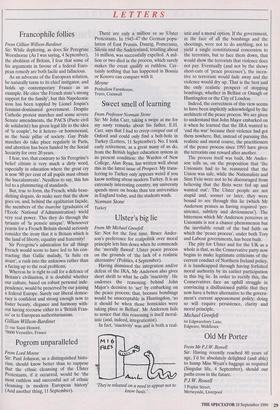Ulster's big lie
From Mr Michael Grenfell Sir: Not for the first time, Bruce Ander- son's preference for realpolitik over moral principle lets him down when he commends the 'morally flawed' Ulster peace process on the grounds of 'the lack of a realistic alternative' (Politics, 4 September).
Having dismissed the integration and/or defeat of the IRA, Mr Anderson also gives short shrift to what he calls 'inactivity'. He endorses the reasoning behind John Major's decision to 'ace by embarking on the peace process: that, because bombings would be unacceptable in Huntingdon, `so it should be when those homicides were taking place in Belfast'. Mr Anderson fails to notice that this reasoning is itself moral- istic (and, indeed, integrationist).
In fact, 'inactivity' was and is both a real- `They're released on a need to appear not to know basis.' istic and a moral option. If the government, in the face of all the bombings and the shootings, were not to do anything, not to yield a single constitutional concession to the terrorists, but to face them down, that would show the terrorists that violence does not pay. Eventually (and not by the showy short-cuts of 'peace processes'), the incen- tive to terrorism would fade away and the violence would dry up. That is the best and the only realistic prospect of stopping bombings, whether in Belfast or Omagh or Huntingdon or the City of London.
Indeed, the correctness of this view seems to have been implicitly acknowledged by the architects of the peace process. We are given to understand that John Major embarked on it when he learned that the IRA wanted to `end the war' because their violence had got them nowhere. But, instead of pursuing this realistic and moral course, the practitioners of the peace process since 1993 have given the terrorists one reward after another.
The process itself was built, Mr Ander- son tells us, on the proposition that 'the Unionists had to be reassured that the Union was safe, while the Nationalists and Sinn Fein were not to be discouraged from believing that the Brits were fed up and wanted out'. The Ulster people are not stupid and, sooner or later, they were bound to see through this lie (which Mr Anderson praises as having required `per- sistence, subtlety and deviousness'). The bitterness which Mr Anderson perceives in Unionists is not a chance phenomenon but the inevitable result of the bad faith on which the `peace process', under both Tory and Labour governments, has been built.
The pity for Ulster and for the UK as a whole is that, as the Conservative party now begins to make. legitimate criticisms of the current conduct of Northern Ireland policy, it is handicapped through having forfeited moral authority by its earlier participation in this big lie. In order to rectify this, the Conservatives face an uphill struggle in convincing a disillusioned public that they now have a better alternative to the govern- ment's current appeasement policy; doing so will require persistence, clarity and moral principle.
Michael Grenfell
64 Edgwarebury Lane, Edgware, Middlesex


























































































 Previous page
Previous page